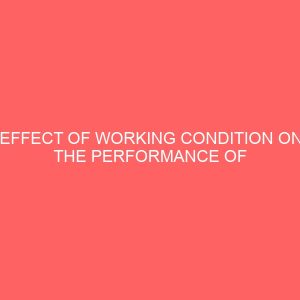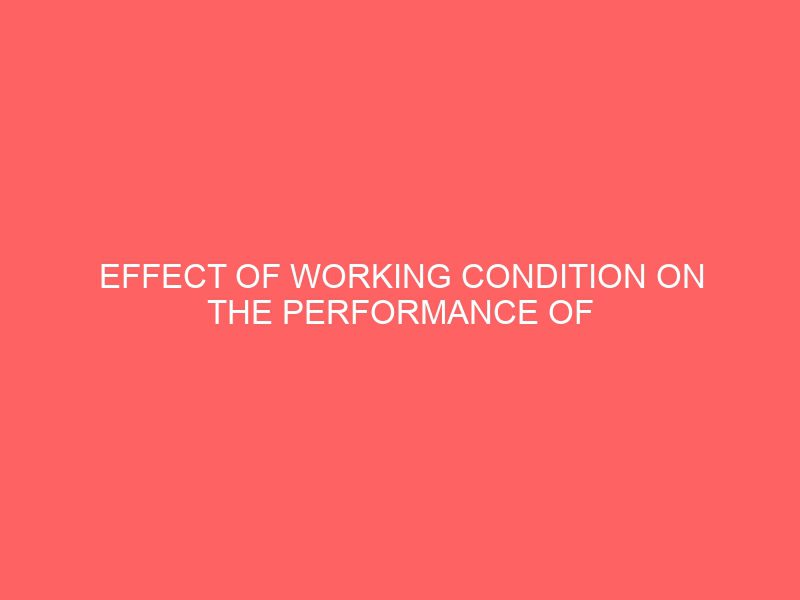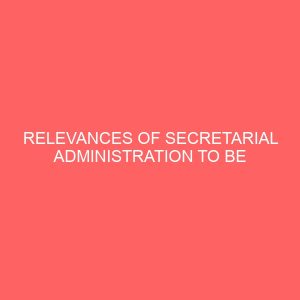Description
CHAPTER ONE
INTRODUCTION
1.1 Background Of The Study
Wherever Man is at the company he keeps is always influenced by his internal environment. The reason for doing that is that he is easily assimilated into the totality of work.
Generally, the secretary?s work can include many varied duties like research, typing, producing flyers, filing, transcription, screening telephone calls, appointments, liaising with clients and other staff members, attending meetings, composing of letters, making travel arrangement, supervising, training staff etc. The major role or tasks the secretary performs is to provide assistance to a manager or managers (Amoor, 2009).
The Modern Business Office is the office gazette with information and communication technology devoid of the traditional way or manual way of performing tasks. In modern world, no business or office can succeed without the Information and Communication Technology. It makes work to be done faster, clearer, and more accurate than the traditional method of using typewriters, duplicating machine, cutting of stencil, delay in – 17 – transmission of message, filing in cabinets in terms of storing information etc. but in modern business office Information and communication Technology had taken over every burden. Changes as a result of offices automation, has brought about new methods in carrying out functions performed by Secretaries in organizations. At the centre of the new trends in the office are the office information systems and these new trends in technological innovations place greater responsibilities on business educators and secretarial education students. Secretaries in the organizations of yesterday dealt with papers, worked with manual machines, relied on postal services for external communications and kept the office records in files and cabinets. Nowadays, secretaries do not deal with papers or carry out their duties manually because all office tasks are handled with electronic and telecommunication gadgets (Ntukidem, 2000).
1.2 Statement of the Problem
Office technology and innovation have affected the way things are done in the office. This means great transformation in the tasks performed by Secretaries in the modern business offices such as: Communication services, Computer operation, word processing, Database, Excel etc.
From observation and interaction of the researcher with some of the Secretaries, it was observed that some of the equipment and machines used in producing documents are obsolete and cumbersome and also not able to meet up with the current challenges in the offices with the global Technology of the 21st Century.
More so, from researcher?s interaction with Secretaries working in an organization it was found that some of them were not able to operate computers because they were adaptive to the use of typewriter which rendered their service in an organization useless and these made their employer to look for someone who is computer literate and acquainted with the new technologies. Another problem observed was that Secretarial Education teachers that is, those that found themselves in teaching line were not able to teach computer courses effectively even to operate computer was difficult instead they hired the services of people from other department to take the course or that particular subject.
In line with the stated problems, the researcher deemed it necessary to carry out this study in order to know the actual job tasks the Secretaries are required to perform in modern business offices.
1.3 Objectives of the Study
The major objective of this study is to investigate/examine the effect of working condition of secretary in an organization required in modern business offices and implication on Secretarial Education Curriculum in the North-Central Nigeria Unilever Nigeria plc.
The specific objectives are to:
1. Investigate the job-tasks which are required by the Secretaries in modern business offices in Nigeria Unilever Nigeria plc.
2. Examine the impact of Information Technology on the performance of Secretaries.
3. Examine the competencies required by Secretaries in performing job-tasks in modern business offices in the North-Central Nigeria.
4. Investigate the lapses in the current curriculum used in the preparation of Secretarial Education graduates for the job-tasks in modern business offices in the North-Central Nigeria.
1.4 Research Questions
To further focus on this study, the following research questions are posed:
1. Are secretaries in Unilever Nigeria Plc likely to resign if they are not satisfied with the working conditions of the organization?
2. Does the work environment in Unilever Nigeria Plc encourage secretaries to put in longer hours in their jobs because they are adequately compensated in terms of better salaries, attractive housing allowances, transport allowances, etc?
3. Does the work environment in Unilever Nigeria Plc provide opportunities for secretaries to grow and develop them intellectually?
4. Are there external training programmes organized by the company for secretaries to improve themselves and enhance the performance of their jobs?
1.5 Scope Of The Study
The study is not designed to cover the manufacturing companies in Nigeria but it is limited to Unilever Nigeria Plc, Aba office. Efforts have been specifically devoted to find out how the effect of internal environment affects the job performance of staff of Unilever Nigeria Plc for this purpose; the study covers both the junior and middle level management staff.
1.6 Limitation Of The Study
This is limited to Unilever Nigeria Plc Aba office in Aba metropolis due to time and logistics constraints, which made extensive coverage of the manufacturing location impossible.
1.7 Significance Of The Study
This study will explore the effect of working condition on secretary performance and the make-up of what constitutes a good organizational productivity in the company used as a case study. It is intended to be of interest to the top management in the manufacturing companies who would find the study very essential as a guide in structuring the internal environment and make it a better place, putting all the necessary facilities in place to enhance efficiency and also increase the level of job performance.
1.8 Definition Of Terms
In this research the under listed terms shall be deemed as having the following meanings respectively:
Secretary: an employee who does clerical and administrative work in an office for a person or organization.
Environment: Surrounding conditions that influence development or growth.
Employee: Someone who works in an office or a person, who performs services for an employer under a contract of service.
Performance: This is the act of doing a piece of work which one is either ordered to do or promised to do. It could be as the result of an act, which is measured in quality or in quantity.
Productivity: The rate or efficiency of work especially in manufacturing production.
Organization: a group of people identified by a shared interest or purpose.
1.9 Historical Background Of Unilever Nigeria Plc
Unilever Nigeria Plc, formally known as Lever Brother Nigeria Plc is one of the oldest manufacturing outfits in Nigeria; the company was established in 1983 to manufacture soap using palm oil. Over the years the company diversified and expanded its operation to the production and market toilet soap, non-soapy detergent, foods and personal products including tooth pastes, body cream, lotion and body care product.
The company through selected acquisition has strengthened its merger with Lipton Nigeria limited in 1985, Chesebrough product limited in 1988 and lately in 1995 with Unilever Nigeria Plc. In order to ensure sustenance in management, the company now has four manufacturing sites for its operation from the original site at Apapa, the premier and largest site produced soap such as sunlight, personal products mainly tooth paste and range of Vaseline, the second oldest site, Aba, it devoted to the product of the non-soapy detergent powders and bars. Here, the company makes such popular brands as Omo. The third and newest of the plant commissioned in 1993 is the ultra-modern food factory in Agbara, where the company produces Royco, blue band among others and of course the fourth the Ogun site where such products as Elide, peers, etc, are produced.
The company is fully committed to backward integration and self-sufficiency and has made considerable progress in its effort towards local sourcing and development of raw materials. The tea plantation on the manbilla, plateau under sources the company?s unrelenting drive for self-sufficiency. The first crop of tea was harvested for test packing at the end of 1991 and a processing factory for the tea leaves has been completed on site. The company has also built a large palm kernel mill at its Aba factory to improve the supply of vegetable oil an essential raw material for soaps and edibles production. It is also making investment in oil palm plantation in order to improve its local sourcing. Unilever Nigeria plc range of quantity products are distributed and sold at uniform prices all over the country. The company struggles to lead in all its core markets of fast moving customer products and achieve strong profitable growth by being the best at identifying and meeting consumers? needs.







